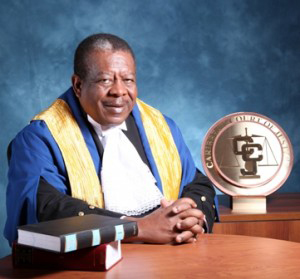Recognizing the need for greater efficiency within regional judiciaries, the Caribbean Court of Justice (CCJ) is leading the way through the development of its Advanced Performance Exponents (APEX) initiative.
Its mandate is to support court technology solutions and services in Caribbean courts, while serving as a trust-bridge between technology service providers and the region’s courts, by providing advisory services to both courts and governments.
Additionally, it seeks to facilitate development of a region-wide ecosystem for court service innovation and support, through capacity building, training and certification programmes.
CCJ President, Sir Dennis Byron, has praised the innovation as being one of the major accomplishments of his presidency.

Delivering the keynote address at the 37th Annual Bar Dinner, held at the Pegasus in November, Justice Byron said that APEX is a special-purpose non-profit agency, “committed to delivering technology-based solutions and services to support court ecosystems.”
He said APEX is owned by regional judiciaries and the legal profession, noting, that it has the potential to further advance the justice landscape of the Caribbean region.
Implemented only this year, the judge said that APEX has already developed technology modules, specifically for the legal profession, as well as to support the litigation management in law offices.
The Guyana Bar Association (GBA) which is an institution member, has lauded the initiative.
In an interview with this newspaper, Bar President, Kamal Ramkarran, said the initiative is welcomed, noting that it will save considerable time and expense, since printing will be reduced, as will the need for physically sending persons out to serve documents which can be done via email.
Explaining the efficiency with which the CCJ operates because of its technological advancements, Ramkarran said the Trinidad-based court has a portal into which lawyers can login to view all their cases from anywhere in the world.
Once logged in, he said access can be made to the case management checklists and orders given by the court. He said also, that once documents are filed with the court, email notifications are sent to lawyers.
It was against this backdrop that the GBA President said he hopes the local judiciary will take swift steps at ensuring that the APEX initiative will be implemented, noting, “It will transform legal practice in Guyana.”
Expressing his delight, the attorney said that APEX will greatly aid the smooth running of the administration of justice, since law office software, for which it also caters, will be more efficient.
Auspices
Ramkarran said that this particular software, which also falls under the auspices of APEX, seeks to foster effective and efficient management of lawyers’ office, which he said will in turn add to a more efficient justice system.
On November 9, Ramkarran and Bar Secretary, attorney Pauline Chase, along with other members, facilitated a road show promoting APEX, through presentations on the software.
Given the local fraternity’s outstanding reception of the initiative, Sir Dennis said he now expects that the quality of law-office litigation management will show considerable improvement. In the same vein, he challenged the legal profession to support the judicial effort by improving justice delivery with their own efficiencies.
The CCJ head said that as APEX develops, he envisions it continuing to facilitate programmes and initiatives aimed at strengthening the justice systems of the region and improving the standards of efficiency in court-related services.
The ultimate goal of APEX he stressed, is to create an entire value chain, to support the improvement and strengthening of Caribbean courts and justice sector institutions and the developments of Caribbean jurisprudence.
The inaugural APEX convention was held on November 27 in The Bahamas with objectives, among which were to raise awareness of regional, technology-enabled options by providing insight to e-discovery and court performance management.
Additionally, it sought to explore best practices in developing principles, norms and rules for regionally-relevant and responsible Caribbean justice technology design, adoption and support.
Asked about the positive impacts APEX is likely to have on the transcription of evidence which is now being done by the New Sexual Offences Court, Ramkarran said it will boost the court’s technological capacity.
He said he hopes that transcription of evidence will not only be limited to the Sexual Offences Court, but should be implemented in all the courts of Guyana.
He said that through this process which caters for verbatim records, as opposed to hand-written notes taken by judged and magistrates, judicial time will be significantly saved and trials will be expedited.
The Bar president noted too, that it would be easier for lawyers to prepare legal submissions as they would be furnished with the transcripts after every hearing, instead of having to read through notes of evidence, which is more time consuming
The Caribbean’s first ever Sexual Offences Court was launched at the High Court in Georgetown a month ago.
With the exception of this court, judges and Magistrates in other courts in the country are tasked with manually recording the testimony of witnesses, though many of their regional counterparts enjoy the use of technological advancements in this regard.
Sir Dennis has called for this archaic method of evidence-taking in Guyana to end, to make way for digital transcription, as one of the means of reducing delay.





